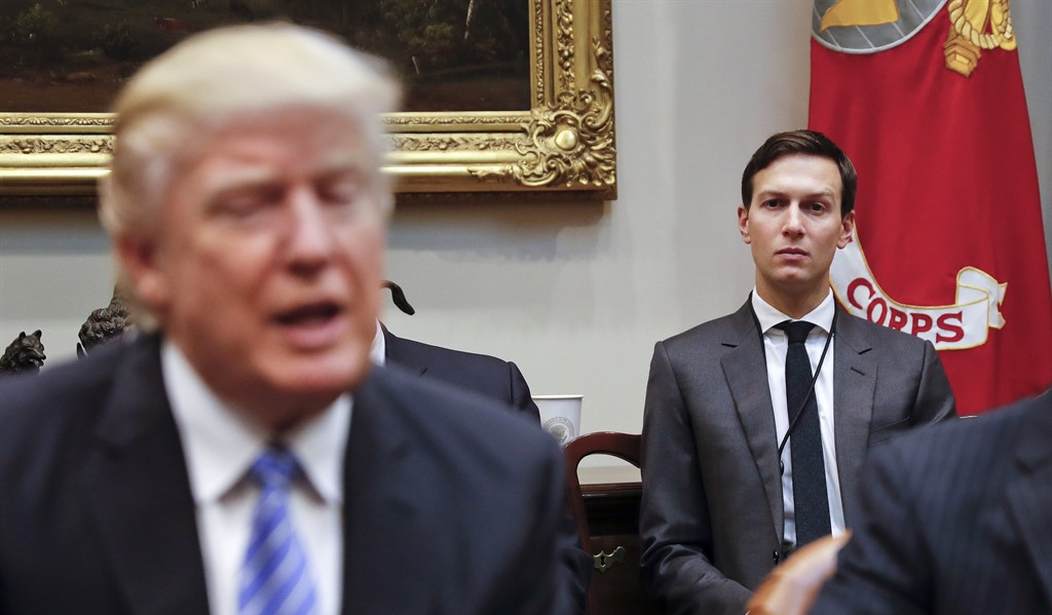Another victory for Kushner over Bannon. According to Politico, Bannon wanted to end the cost-sharing subsidies, which help defray the out-of-pocket expenses for lower-income people who buy silver plans on the O-Care exchanges, on the theory that it would trigger a more rapid collapse of the law. Which is certainly correct: Without the $7 billion they were counting on from Uncle Sam to reduce consumers’ deductibles, insurers would have to either come up with that money themselves or force the expense onto consumers, some of whom would be unable to pay and would drop their plans. That means a thinner risk pool and increased odds of massive losses, a prospect that could send insurers fleeing from the markets. Kushner argued that Trump should keep the subsidies going — even though the Obama White House was sued over them by House Republicans on grounds that the money for the subsidies was never formally appropriated. The House won at the trial level last summer, generating suspense: Would the Trump White House battle Paul Ryan et al. in court to try to keep the subsidies going?
Democrats and consumer advocates say millions of people could lose coverage if the Trump White House reversed the position of the Obama administration, dropped the appeal and accepted the argument of House Republicans.
The Trump administration has not clearly indicated its position on the appeal. Asked to clarify, the Department of Health and Human Services sent a written statement on Monday: “The precedent is that while the lawsuit is being litigated, the cost-sharing subsidies will be funded. It would be fair for you to report that there has been no policy change in the current administration.”
Makes sense. If Trump really does expect ObamaCare to collapse under its own weight, forcing Democrats and Republicans to the table to hash out a compromise solution, it stands to reason that he should want to keep the GOP’s fingerprints off of that collapse as much as possible. If he gives the law a hard shove by yanking subsidies and it topples over, Democrats will simply blame him and Republicans for the chaos that follows. That’s dangerous politically, so Trump is going to keep the subsidies going — for now. A tantalizing what-if, though: What if the Trump White House loses its appeal and the subsidies are held unconstitutional? Trump could solve that problem by asking Ryan and McConnell to formally appropriate the $7 billion, but there’s no reason to believe that would make it through Congress. Without Democratic help, that is.
Two influential Republicans — Representatives Tom Cole of Oklahoma, the chairman of the Appropriations subcommittee responsible for health spending, and Greg Walden of Oregon, the chairman of the Energy and Commerce Committee — said Congress should appropriate money for the cost-sharing subsidies…
“Do you really think the Freedom Caucus would support a supplemental appropriation of $7 billion to continue supporting the insurance companies so they stay in and shore up Obamacare individual markets?” [GOP Rep. Chris] Collins asked. “Do you really think they’re going to support that?”
Yeah, there’s no way. Which means even more suspense: Would Pelosi’s caucus help Trump out by voting to appropriate funding for the subsidies or would she follow the Democratic obstructionist playbook thus far of voting no on everything in order to maximize the GOP’s political pain? The risk to Dems if they obstruct is that Trump can then go to the public and claim that he’s willing to put up the money but, ironically, it’s Democrats who refuse to help him get it. Whom would voters blame in that case if the law tanks? The buck usually stops with the president, but Trump has a media megaphone like no other president has ever had.
Still more suspense: How will this decision play with Trump’s Republican base? Freedom Caucus-ers and related fiscal conservatives will be horrified, but note the upward trend in Republican support for some key provisions of ObamaCare over the last seven years per YouGov:

Support for subsidies to purchase insurance is at 62 percent among GOPers, not far off the pace of the general public. Elsewhere, YouGov asked voters if they’d support a “public option” on the insurance exchanges, i.e. a plan run by the government itself and a major step towards single-payer if it happens. Among the wider public, 57 percent said yes; among Republicans, a near-majority of 48 percent agreed, up from 27 percent in 2009. And on the question of whether people aged 55-64 should be able to get Medicare early if they can’t find insurance anywhere elsewhere, 70 percent of Republicans now say yes, statistically indistinguishable from the 72 percent of the general public that says so. Eight years ago, just 48 percent of Republicans agreed. Conservatives’ core fear about ObamaCare when it passed was that it would shift the electorate’s expectations irreversibly on what health insurance should do and what government’s role in it should be. Seems like those fears have been borne out. But then, in light of the results of last year’s Republican primary, none of this is surprising. As Trump himself famously said: It’s the “Republican Party,” not the “Conservative Party.” Man, is it ever.







Join the conversation as a VIP Member